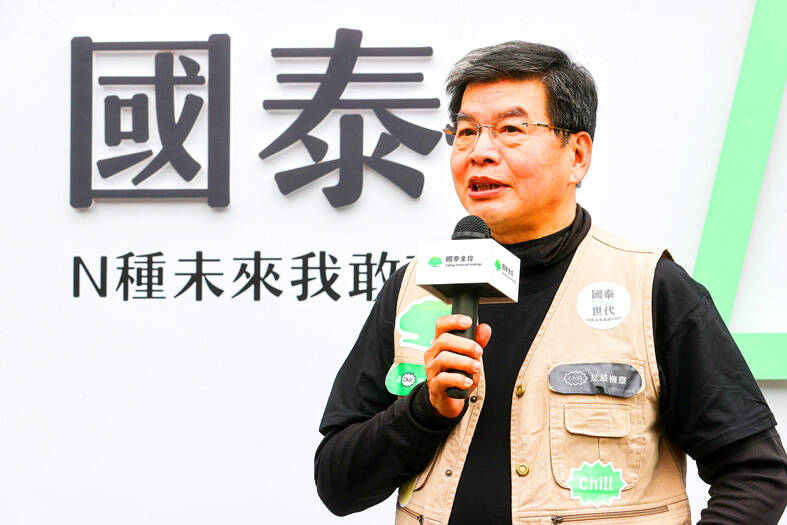Cathay Financial Holding Co (國泰金控), the nation’s biggest financial services provider, saw its net profit plunge 80 percent year-on-year to NT$6.88 billion (US$225.6 million) in the first quarter of this year, as its flagship unit Cathay Life Insurance (國泰人壽) drifted into the red due to its massive foreign exchange losses.
The life insurer lost NT$2.34 billion in the first three months after incurring losses due to the volatility in the New Taiwan dollar against the US dollar, the insurer said on Wednesday.
The NT dollar appreciated 2.18 percent against the US dollar in January, as traders expected the US Federal Reserve to slow the pace of its rate hikes, the insurer said.

Photo: CNA
However, the local currency depreciated rapidly versus the greenback in February, as high inflation and strong employment in the US prompted market speculation that the Fed might raise interest rates again, the insurer said.
The volatility in rates caused hedging costs against foreign exchange risks to rise and led to significant losses at Cathay Life Insurance, it said.
Cathay Life Insurance registered a loss of NT$2.6 billion for the first two months of this year, although it turned a profit of NT$260 million last month by using proxy hedging tools to manage its foreign exchange costs and by generating more recurring income, it said.
The life insurer said its foreign exchange reserves topped NT$42 billion at the end of last month, which would help absorb foreign currency losses and give it more flexibility in management.
However, Cathay United Bank (國泰世華銀行) saw its cumulative net profit rise 33 percent annually to a record NT$9.17 billion in the first quarter, after rate hikes by Taiwan’s central bank helped it gain 25 percent additional net interest income from a year earlier, the company said.
As private consumption rebounded after the COVID-19 pandemic, the bank recorded rising credit card spending and earned more net fee income, it said.
Although the bank ended its 10-year co-branded credit card partnership with Costco Wholesale Taiwan Ltd, it introduced a new credit card to retain customers.
The lender said it had 6.38 million valid credit cards in circulation as of the end of last month, the highest among its peers.
Cathay Century Insurance Co (國泰世紀產險) registered a net loss of NT$580 million during the first quarter, due to compensation payments to COVID-19 policyholders, it said.

RUN IT BACK: A succesful first project working with hyperscalers to design chips encouraged MediaTek to start a second project, aiming to hit stride in 2028 MediaTek Inc (聯發科), the world’s biggest smartphone chip supplier, yesterday said it is engaging a second hyperscaler to help design artificial intelligence (AI) accelerators used in data centers following a similar project expected to generate revenue streams soon. The first AI accelerator project is to bring in US$1 billion revenue next year and several billion US dollars more in 2027, MediaTek chief executive officer Rick Tsai (蔡力行) told a virtual investor conference yesterday. The second AI accelerator project is expected to contribute to revenue beginning in 2028, Tsai said. MediaTek yesterday raised its revenue forecast for the global AI accelerator used

TEMPORARY TRUCE: China has made concessions to ease rare earth trade controls, among others, while Washington holds fire on a 100% tariff on all Chinese goods China is effectively suspending implementation of additional export controls on rare earth metals and terminating investigations targeting US companies in the semiconductor supply chain, the White House announced. The White House on Saturday issued a fact sheet outlining some details of the trade pact agreed to earlier in the week by US President Donald Trump and Chinese President Xi Jinping (習近平) that aimed to ease tensions between the world’s two largest economies. Under the deal, China is to issue general licenses valid for exports of rare earths, gallium, germanium, antimony and graphite “for the benefit of US end users and their suppliers

Dutch chipmaker Nexperia BV’s China unit yesterday said that it had established sufficient inventories of finished goods and works-in-progress, and that its supply chain remained secure and stable after its parent halted wafer supplies. The Dutch company suspended supplies of wafers to its Chinese assembly plant a week ago, calling it “a direct consequence of the local management’s recent failure to comply with the agreed contractual payment terms,” Reuters reported on Friday last week. Its China unit called Nexperia’s suspension “unilateral” and “extremely irresponsible,” adding that the Dutch parent’s claim about contractual payment was “misleading and highly deceptive,” according to a statement

Artificial intelligence (AI) giant Nvidia Corp’s most advanced chips would be reserved for US companies and kept out of China and other countries, US President Donald Trump said. During an interview that aired on Sunday on CBS’ 60 Minutes program and in comments to reporters aboard Air Force One, Trump said only US customers should have access to the top-end Blackwell chips offered by Nvidia, the world’s most valuable company by market capitalization. “The most advanced, we will not let anybody have them other than the United States,” he told CBS, echoing remarks made earlier to reporters as he returned to Washington